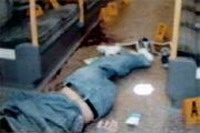Brazilian's shooting death unveils failures of London's police force
London's police force was charged with endangering the public by killing a Brazilian man during a frantic manhunt for four failed suicide bombers who officers feared were set on trying to detonate bombs again.

Police had staked out an address belonging to two of the failed bombers at dawn on July 22, 2005, after a clue from one of the scenes led them there. It was less than 24 hours after the terrorists' devices failed to ignite on three subway cars and a double-decker bus.
The manhunt unfolded as the British capital was already on edge after four suicide bombers killed 52 passengers two weeks earlier.
The officers watching the building trailed Brazilian electrician Jean Charles de Menezes, 27, out of the apartments, fearing he was one of the bombers. They followed him onto two buses, into a subway station and finally into a train. There, firearms officers, believing he was a bomber, shot him seven times at close range.
On Thursday, a jury found police guilty of breaking health and safety laws. Judge Richard Henriques ordered the Metropolitan Police to pay a total of 560,000 pounds (US$2.1 million; 1.5 million EUR) for breakdowns in the operation that led to police killing de Menezes in front of morning commuters.
"One person died and many others were placed in potential danger," judge Richard Henriques said after the jury's verdict.
The judge fined the force 175,000 pounds (250,000 EUR, US$362,000) and ordered it to pay costs of 385,000 pounds (552,000 EUR, US$798,000), adding that a heavier fine could lead to cuts in essential policing.
The judge acknowledged the manhunt had been "a unique and difficult operation."
"This was very much an isolated breach brought about by quite extraordinary circumstances," he said.
The force had denied the charge, saying the killing was an error, not a crime. Outside the London's Central Criminal Court, police chief Ian Blair expressed "my deep regret" over de Menezes' death.
"No police officer set out on that day to shoot an innocent man," he said. "I am certain that this death was the culmination of actions by many hands, all of whom were doing their best to handle a terrible threat facing London on that day - a race against time to find the failed suicide bombers of the day before."
Blair said he had no intention of resigning after the verdict. Prime Minister Gordon Brown said he had "full confidence" in the police chief, despite opposition parties' calls for Blair to step down.
Blair did not rule out an appeal.
No individual officers were charged over de Menezes' death. The foreman of the jury told the court that blame should not rest with Deputy Assistant Commissioner Cressida Dick, the officer in charge of the operation.
During the trial, prosecutors claimed "fundamental failures" at all levels led to the death of de Menezes.
Police staked out the apartment building at 4:55 a.m. but the firearms team had still not arrived four hours later when de Menezes, left on his way to work.
Police were unsure if the Brazilian was Hussain Osman, who dropped his gym membership card at the scene of one of the failed attacks. An officer who was meant to identify him as he came out was away "relieving himself," prosecutor Clare Montgomery told the court.
The surveillance officers who asked the Scotland Yard control room several times if they should arrest him but were told to wait for the firearms team to arrive, Montgomery said.
She described the chaos at police headquarters, claiming an officer responsible for listening to messages could not hear what was being said because colleagues not involved in the case crammed into the room to listen to events unfold.
Despite officers' doubts about his identity, Dick testified she was told five times that the man police were following was Osman.
An officer called out on the radio that the man being pursued was "our man" and was acting "nervous and twitchy," a firearms officer identified as "Ralph" testified.
The marksmen could be seen running down the subway station's escalator in security video footage shown to jurors.
A surveillance officer, identified as "Ivor," described following de Menezes into the subway car, grabbing him and pinning him to his seat when he realized firearms officers were there. He shouted: "Here he is."
The armed officers shot de Menezes five times in the head, once in the neck and once in the shoulder. The jury was shown photos of de Menezes lying dead on the car's floor.
Police lawyer Ronald Thwaites told the jury that de Menezes was shot because he had behaved suspiciously and "because when he was challenged by police he did not comply with them, but reacted precisely as they had been briefed a suicide bomber might react at the point of detonating his bomb."
He added that de Menezes had a forged stamp in his passport and traces of cocaine in his urine. After the verdict, Harriet Wistrich, one of Jean Charles' lawyers, said police had "descended to the gutter" to try to blacken his name.
"Thetactics of the defense were horrible and totally unnecessary and ... we deplore it," she said.
Thwaites argued that a health and safety prosecution was a last resort by prosecutors who had failed to find enough evidence to charge any individual with murder or manslaughter. A conviction would mean future police operation would be compromised, he said.
But the judge told jurors that the police were not above the law and they agreed with prosecutors that the operation was seriously flawed.
"An innocent man was killed but the four suicide bombers were safely captured by police without a shot being fired," Henriques said after delivering the verdict.
Subscribe to Pravda.Ru Telegram channel, Facebook, RSS!




